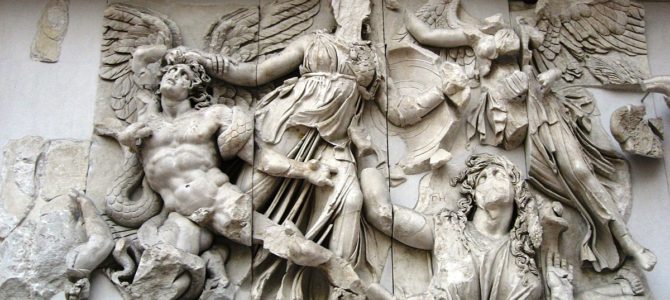
Christianity’s advent into the world introduced a tension that has since become everpresent in public life: The proper relation of religion and politics. Until Christ, church and state were largely intertwined. Indeed, ever since just about every other religion has continued to be better at integrating into and serving political ends than Christianity has.
What accounts for this singularity? In the sixth lecture of Hillsdale College’s free online Western Heritage 101 course we’re following, history professor Korey Maas says it’s Christianity’s status as an exclusive faith that does not allow the worship of other gods, and its claims to eternal truths that transcend and thus critique and undermine temporal political claims or arrangements.
“Social and political cohesion as the Romans understood it was predicated on a common worship of common gods. A shared ‘cult’ was the foundation of a shared culture. So not to offer worship to the gods of Rome was regarded as both antisocial and treasonous,” Maas says, discussing the ancient Roman context in which Christianity began.
The Christian church was regarded as a competitor to the state, which called into question Christians’ allegiance to the empire. Romans weren’t just making this up, either. Pre-Christianity, Rome would generally incorporate into its pantheon the gods of all the tribes they conquered. They operated on a kind of religious reciprocity: Worship our gods, and we’ll let you keep worshiping yours.
Like Judaism, which also consequently had fraught relations with Rome, Christianity’s god claimed to be the only true god, which set him above and therefore potentially against the Roman state’s decrees and way of life. Indeed, the very idea of religion being at all separate from the state is Christian in origin, and Christianity is the only religion to ever offer as well as create the cultural context in which separation of church and state was even possible.
Christianity’s universalism — offering itself to all people of all races, tribes, and tongues — created internal strength but also external opposition. It could appeal to people across old tribal lines, which in turn undermined tribal and national government structures that drew strength by tying people’s religious impulses to their political regime. Independent religion also threatens a state that uses religion to strengthen compliance and allegiance, and one bent on broader geographic political power. Telling citizens that the gods favor your tribe uniquely is a way to control them and boost military aggression in a way today many describe as nationalism.
Thus Christianity early on was an outlaw religion. It was regarded as subversive to the Roman regime. Maas cites Roman governor Pliny’s letter to the Emperor Trajan, in which Pliny says he kills Christians whenever they pop up but doesn’t actively hunt them out. He asks if that is in keeping with official Roman policy, and Trajan replies that it is. In the course of this exchange, Pliny notes with astonishment that Christianity has spread so fast among ages, sexes, and regions.
Indeed, by the late fourth century, Maas says, Christians appear to have become the majority religion within the Roman empire, despite steadfast state persecution. He lists a number of reasons for this, including Christians’ documented care for the needy regardless of tribal affiliation and their openness to social castoffs such as slaves, women, and children. But Christians also made the intellectual case for themselves to their Hellenized Romans on pagan philosophical terms. Maas cites Justin Martyr’s First Apology, addressed to Caesar Augustus, as a prime example of this kind of apologetic.
That was in turn controversial in Christian circles, as well. “What, indeed, has Athens to do with Jerusalem?” famously asked the Christian writer and lawyer Tertullian. He pointed out that, while Romans conquered Greece militarily, Greece’s ideas colonized Rome. Tertullian worried this would happen with the church. Indeed, it did happen with the church, but the church became the new colonizer of the Hellenized Roman mind, using Roman infrastructure — a unified language, system of roads, laws — to spread ideas that ultimately contributed to Rome’s downfall as a civilization.
Thus questions about the tensions and proper balancing points between faith and reason, Jerusalem and Athens, religion and politics, would “become a staple of the Western heritage, enduring, of course, even into the present,” Maas says.
These questions remain on my mind today on points such as how to maintain allegiance to a United States whose various layers of government not only protect but promote the mass murder of innocent unborn, preference sexual profligacy at the expense of the fundamental natural right to worship in accord with one’s conscience, plunder from people who work and save to redistribute to those who will not, and are inclined to send my sons overseas to expend their blood on behalf of murderous foreign tyrants rather than any clear threat to national defense.









